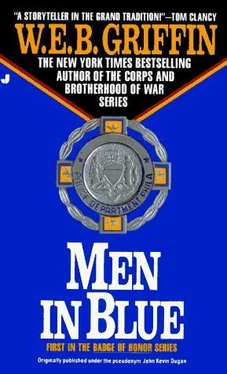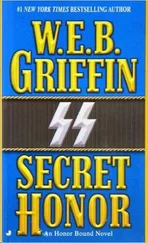W.E.B Griffin - Men In Blue
Здесь есть возможность читать онлайн «W.E.B Griffin - Men In Blue» весь текст электронной книги совершенно бесплатно (целиком полную версию без сокращений). В некоторых случаях можно слушать аудио, скачать через торрент в формате fb2 и присутствует краткое содержание. Жанр: Полицейский детектив, на английском языке. Описание произведения, (предисловие) а так же отзывы посетителей доступны на портале библиотеки ЛибКат.
- Название:Men In Blue
- Автор:
- Жанр:
- Год:неизвестен
- ISBN:нет данных
- Рейтинг книги:4 / 5. Голосов: 1
-
Избранное:Добавить в избранное
- Отзывы:
-
Ваша оценка:
- 80
- 1
- 2
- 3
- 4
- 5
Men In Blue: краткое содержание, описание и аннотация
Предлагаем к чтению аннотацию, описание, краткое содержание или предисловие (зависит от того, что написал сам автор книги «Men In Blue»). Если вы не нашли необходимую информацию о книге — напишите в комментариях, мы постараемся отыскать её.
Men In Blue — читать онлайн бесплатно полную книгу (весь текст) целиком
Ниже представлен текст книги, разбитый по страницам. Система сохранения места последней прочитанной страницы, позволяет с удобством читать онлайн бесплатно книгу «Men In Blue», без необходимости каждый раз заново искать на чём Вы остановились. Поставьте закладку, и сможете в любой момент перейти на страницу, на которой закончили чтение.
Интервал:
Закладка:
The glass front of the cashier's stand slid with a crash to the floor, and there was an eruption of liquid and falling glass in the rows of liquor bottles in the service bar.
Dutch grabbed the skinny blond kid by the collar of his zipper jacket and threw him violently across the room. Then he took three steps to the door of the diner. He pushed it open with his shoulder, and went through it; and then he was holding his pistol in both hands, taking aim; and then he fired, and again and again.
The noise from his pistol was deafening, shocking, and Louise heard a woman yelp, and someone swore.
The skinny blond boy came running down the aisle. She got a good look at his face. He looked sick.
Louise pushed herself off her chair and ran down the aisle to the cash register.
Dutch was outside, on his knees beside a form on the ground. Louise thought it was another blond boy, but then Dutch turned the body over on its back and she saw lipstick and red, round-framed women's eyeglasses.
"He ran into the restaurant," Louise screamed. When there was no response from Dutch she screamed his name, and got his attention, and, pointing, repeated, "He ran into the restaurant. The blond boy."
He got up and walked quickly past her. She followed him.
The Greek proprietor came up.
"He ran through the kitchen, the sonofabitch," he reported.
Dutch nodded.
He put his pistol back in its holster and fished the cashier's telephone from where it had fallen, onto the cigars and foil-wrapped chocolates, when the glass counter had shattered.
He dialed a number.
"This is Captain Moffitt, Highway Patrol," he said. "I'm at Harbison and the Boulevard, the Waikiki Diner. Give me an assist. I have a robbery and a police shooting and a hospital case. I'm hit. One male fled on foot, direction unknown, white, in his twenties. Long blond hair, brown zipper jacket. No!Goddamn it.Harbison and the Boulevard."
He put the phone back in the cradle, smiled reassuringly at Louise, and raised his voice.
"It's all over, folks," he said. "Nothing else to worry about. You just sit there and finish your meals."
He turned and looked at Louise again.
"Dutch, are you all right?" Louise asked.
"Fine," he said. "I'm fine."
And then he staggered, moving backward until he encountered the wall. His face was now very white.
"It was a goddamned girl!" he said, surprised, barely audibly.
And then he just crumpled to the floor. "Dutch!" Louise cried, and went to him.
He's fainted! That's all it is, he's fainted!
And then she saw his eyes, and there was no life in them.
"Oh, Dutch!" Louise wailed. "Oh, damn you, Dutch!"
Philadelphia, in 1973 the fourth largest city of the United States, lies in the center of the New York-Washington corridor, one of the most densely populated areas in the country.
A one-hundred-mile-radius circle drawn from William Penn's statue atop City Hall at Broad and Market Streets in downtown Philadelphia takes in Harrisburg to the west', skirts Washington, D.C., to the south; takes in almost all of Delaware and the New Jersey shore to the southeast and east; touches the tip of Manhattan Island to the northeast; and just misses Scranton, Pennsylvania to the north.
Within that one-hundred-mile-radius circle are major cities: Baltimore, Maryland; Camden, Trenton, Elizabeth, Newark, and Jersey City, New Jersey; plus a long list of somewhat smaller cities, such as Atlantic City, New Jersey; Wilkes-Barre, Pennsylvania; Wilmington, Delaware, and New Brunswick, New Jersey; York, Lancaster, Reading, Allentown, Bethlehem, and Hazleton, Pennsylvania; plus the boroughs of Manhattan, Brooklyn, and Richmond (Staten Island) of New York City.
There are more than four million people in the "standard metropolitan statistical area" of Philadelphia and its environs, and something over two million people within the city limits, which covers 129 square miles. In 1973, there were approximately eight thousand policemen keeping the peace in the City of Brotherly Love.
The Police Administration Building on Vine Street in downtown Philadelphia is what in another city would be called "police headquarters." In Philadelphia it is known to the police and public as "the Roundhouse."
The architect who envisioned the building managed to pass on his enthusiasm for the curve to those city officials charged with approving its design. There are no straight corridors; the interior and exterior walls, even those of the elevators, are curved.
The Radio Room of the Philadelphia Police Department is on the second floor of the Roundhouse. Within the Radio Room are rows of civilian employees, leavened with a few sworn police officers, who sit at telephone and radio consoles receiving calls from the public, and from police vehicles "on the street" and relaying official orders to police vehicles.
There are twenty-two police districts in Philadelphia, each charged with maintaining the peace in its area. Each has its complement of radio-equipped police cars and vans. Additionally, there are seven divisions of detectives, occupying office space in district buildings, but answering to a detective hierarchy, rather than to the district commander. They have their own, radio-equipped, police cars.
Radio communication is also maintained with the vehicles of the Philadelphia Highway Patrol, which has its own headquarters; with the vehicles of the Traffic, Accident, and Juvenile divisions; with the fleet of police tow trucks; and with the vehicles of the various special-purpose units, such as the K-9 Unit, the Marine Unit, the Vice, Narcotics, Organized Crime units, and others.
And on top of this, of course, is the necessity to maintain communications with the vehicles of the senior command hierarchy of the police department, the commissioner, and his staff; the deputy commissioners and their staffs; the chief inspectors and their staffs; and a plethora of other senior police officers.
With more than a thousand police vehicles "on the street" at any one time, it was necessary to develop, both by careful planning and by trial and error, a system permitting instant contact with the right vehicle at the right time. The police commissioner is not really interested to learn instantly of every automobile accident in Philadelphia, nor is a request from the airport police for a paddy wagon to haul off three drunks from the airport of much interest to a detective looking for a murder suspect in an alley off North Broad Street.
So far as the police were concerned, Philadelphia was broken down into seven geographical divisions, each headed by an inspector. Each division contained from two to four districts, each headed by a captain. Each division was assigned its own radio frequency. Detectives' cars and those assigned to other investigative units (Narcotics, Intelligence, Organized Crime, et cetera) had radios operating on the H-Band.All police car radios could be switched to an all-purpose emergency and utility frequency called the J-Band.
For example, a police car in the Sixteenth District would routinely have his switch set to F-l, which would permit him to communicate with his (the West) division. Switching to F-2 would put him on the universal J-Band. A car assigned to South Philadelphia with his switch set to F-l would be in contact with the South Division. A detective operating anywhere with his switch set to F-l would be on the (Detectives') H-Band, but he too, by switching to F-2, would be on the J-Band.
Senior police brass are able to communicate with other senior police brass, and most often on the detective frequency or on the frequency of some other service in which he has a personal interest. Ordinary police cars are required to communicate through the dispatcher, and forbidden to talk car-to-car. Car-to-car communication is authorized on the J- and H-bands.
Читать дальшеИнтервал:
Закладка:
Похожие книги на «Men In Blue»
Представляем Вашему вниманию похожие книги на «Men In Blue» списком для выбора. Мы отобрали схожую по названию и смыслу литературу в надежде предоставить читателям больше вариантов отыскать новые, интересные, ещё непрочитанные произведения.
Обсуждение, отзывы о книге «Men In Blue» и просто собственные мнения читателей. Оставьте ваши комментарии, напишите, что Вы думаете о произведении, его смысле или главных героях. Укажите что конкретно понравилось, а что нет, и почему Вы так считаете.











